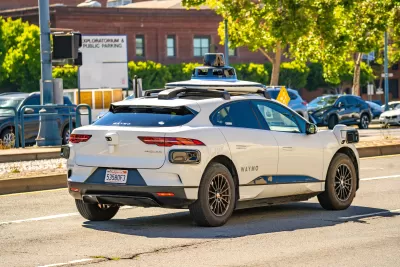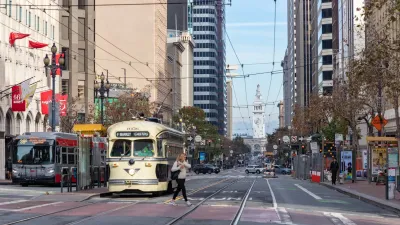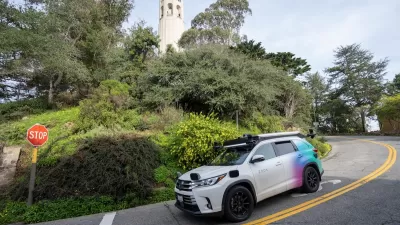Local officials say autonomous cars are not yet safe enough to be permanently deployed across the entire city.

As autonomous taxi companies push for deployment of their self-driving fleets in U.S. cities, city officials and transportation agencies in San Francisco are asking the state to delay the expansion of these services, citing safety and congestion concerns. As Jared Brey explains in Governing, “The stakes are high for all of San Francisco’s street users, and especially for public transit, says Jeffrey Tumlin, director of transportation for the SFMTA.”
“In May, the California Public Utilities Commission issued draft resolutions that would allow Waymo and Cruise, both companies offering self-driving taxi services, to ‘offer passenger service in [their] autonomous vehicles without a safety driver present throughout the city of San Francisco, at all hours of day or night.’” Since then, the vehicles have blocked traffic, stopped dangerously in the middle of the street, driven in transit-only lanes, interfered with emergency response situations, and, in one case, killed a dog.
Public transit officials worry autonomous cars will further disrupt traffic and transit service as transit struggles to recover its ridership and are calling for more data on their safety before they are deployed full-time. The ride-hailing and shared mobility companies that came before autonomous car operators often had combative relationships with cities and regulatory agencies.According to research engineer Tejas Santanam, “Autonomous-vehicle services should take a different tack … working with public agencies to address their needs instead of treating them as obstacles.”
FULL STORY: Why San Francisco Transit Wants a Slower Rollout of Driverless Taxis

Planetizen Federal Action Tracker
A weekly monitor of how Trump’s orders and actions are impacting planners and planning in America.

Map: Where Senate Republicans Want to Sell Your Public Lands
For public land advocates, the Senate Republicans’ proposal to sell millions of acres of public land in the West is “the biggest fight of their careers.”

Restaurant Patios Were a Pandemic Win — Why Were They so Hard to Keep?
Social distancing requirements and changes in travel patterns prompted cities to pilot new uses for street and sidewalk space. Then it got complicated.

Platform Pilsner: Vancouver Transit Agency Releases... a Beer?
TransLink will receive a portion of every sale of the four-pack.

Toronto Weighs Cheaper Transit, Parking Hikes for Major Events
Special event rates would take effect during large festivals, sports games and concerts to ‘discourage driving, manage congestion and free up space for transit.”

Berlin to Consider Car-Free Zone Larger Than Manhattan
The area bound by the 22-mile Ringbahn would still allow 12 uses of a private automobile per year per person, and several other exemptions.
Urban Design for Planners 1: Software Tools
This six-course series explores essential urban design concepts using open source software and equips planners with the tools they need to participate fully in the urban design process.
Planning for Universal Design
Learn the tools for implementing Universal Design in planning regulations.
Heyer Gruel & Associates PA
JM Goldson LLC
Custer County Colorado
City of Camden Redevelopment Agency
City of Astoria
Transportation Research & Education Center (TREC) at Portland State University
Camden Redevelopment Agency
City of Claremont
Municipality of Princeton (NJ)





























